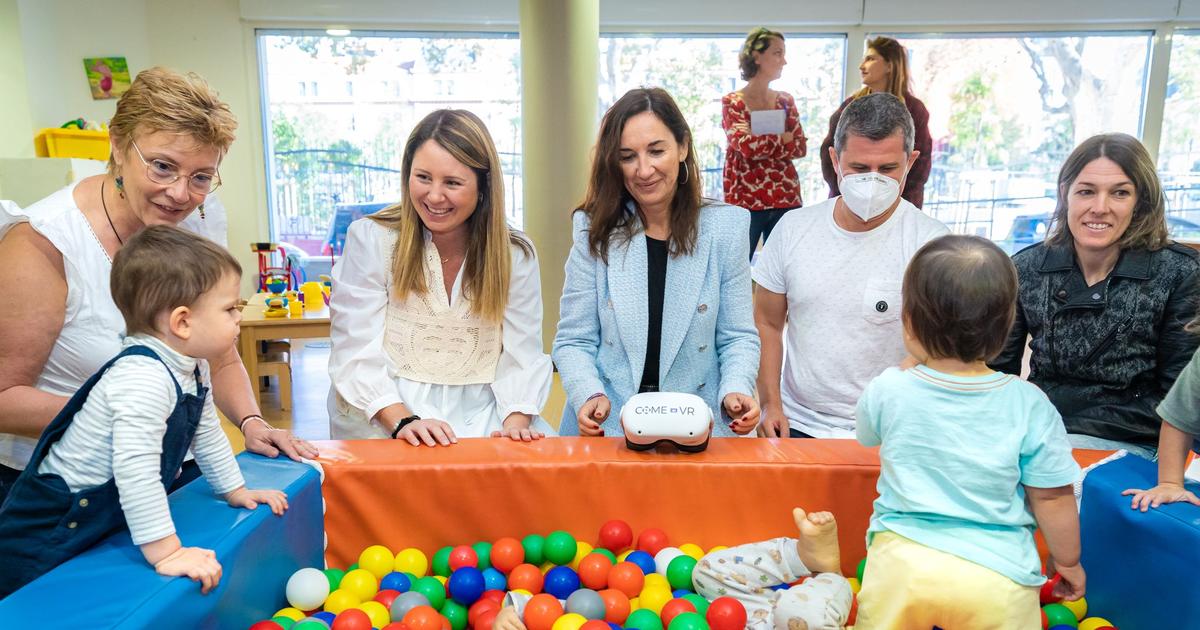In thirty years of business, Jacqueline Dufoux had never felt that.
“The first time that I put the helmet on my eyes,
tells this person in charge of the Health pole at the town hall of Nice,
I saw a little girl coming towards me.
I said to myself: “But what does she want from me?
"I was seized with an apprehension that we don't feel as adults."
Developed by the company Come In VR, this immersive training device - called In the eyes of Lia - has been deployed on an experimental basis in municipal nurseries since September.
Thanks to a virtual reality headset, it is possible to see the world like children.
"Seeing a mother leave, I thought: 'She's not going to turn around?'"
says Jacqueline Dufoux.
“We find ourselves in a world with a lot of colors,
explains Rosalina from France, director of the Mantega crèche.
By putting yourself at the height of the child, you can see how he perceives space and the size of objects.
The idea immediately appealed to Stéphanie Casalta, early childhood director at the town hall.
"Everything seems huge,
" she says.
We don't feel very comfortable and we understand better what the child is feeling.
In classical training, there is often theory… And on the practical side, it is never real cases.
As we have no memory of early childhood, it is an interesting tool because it puts professionals in a situation.
Read alsoWhen virtual reality helps fight pain
With 3D, it is possible to apprehend the perception of a child in certain situations, to measure and understand his frustrations and to become aware of what can disturb him.
“We learn without hearing or touching, but by feeling things
,” underlines David Delaunay, president of Come In VR.
Instead of playing role-playing games, with a virtual reality headset, you face yourself.
You will imagine the emotions of the child.
The first exercise consists of moving around in a crib, trying to grab a book that is out of reach when you are 80 cm tall.
The virtual space is strewn with pitfalls with passing adults.
The second scenario is intended to prevent
"gentle violence"
, with fifteen scenes where an adult can involuntarily traumatize the child: by forcing him to sit down, by removing a toy from his hands or by smelling his diaper in front of others. people.
Changing our ways of training
“The goal is to get people back into their workplace, to relearn how to learn. This allows you to keep the memory of the body, it's not theory, you learn by doing
,” adds David Delaunay.
Former head of an occupational risk prevention organization, he founded Come In VR five years ago.
"Several factors showed that the world of training had changed
," he explains.
One of them was generational.
In the age of smartphones, our focus time has plummeted,
says entrepreneur
.
Imagine: every six seconds, a trainer has to find a trick to get attention back... Despite all the professionalism in the world, it's getting more and more difficult to have people who say: “OK, I've learned something .”»
Read alsoFly over France like a bird
Five years ago, the price of technology went down.
This encouraged David Delaunay to use virtual reality.
“I started with the idea that we had to change our ways of training and professionalize more.
That's why I chose virtual reality,”
he explains.
In Nice, the use of this tool was well received, according to Franck Cini, volunteer ambassador, educator and head of an early childhood relay.
"The start is promising,
" he said.
It makes you want to go further.
Once past the adaptation phase, we are completely in it.
Things happen and we observe them… This upsets our methods but helps us to be more empathetic, to feel things without resorting to indirect observation.
Above all, there is a double challenge: to help train the teams but also to question our own practices.
Eight hundred early childhood staff in Nice should test this atypical tool.

